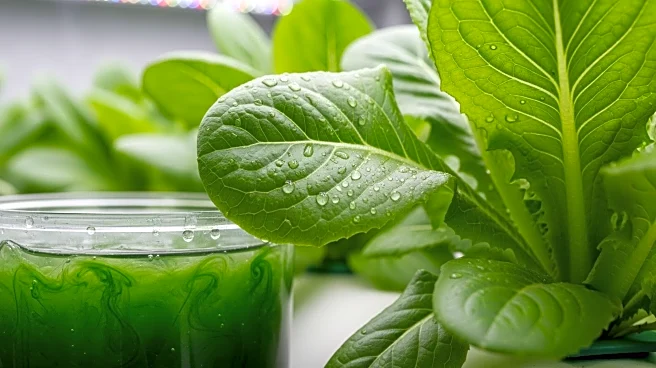What's Happening?
A study conducted in an unheated greenhouse at Ege University in Türkiye has demonstrated that microalgae can significantly enhance plant growth and yield in soilless lettuce cultivation. The research
focused on two microalgae strains, Chlorella sp. and S. obliquus, which were applied to lettuce plants grown in a perlite substrate. The study found that the direct application of live microalgae cultures improved lettuce growth, yield, and leaf color compared to a control group without microalgae. The microalgae were cultivated in channel-type ponds and used as biostimulants and biofertilizers, providing essential nutrients and enhancing enzyme activities.
Why It's Important?
The findings of this study are significant for the agricultural industry, particularly in the context of sustainable farming practices. The use of microalgae as biostimulants and biofertilizers offers a promising alternative to traditional chemical fertilizers, potentially reducing environmental impact and promoting healthier crop production. This approach could lead to increased efficiency in soilless cultivation systems, which are becoming increasingly popular due to their ability to conserve water and reduce soil degradation. The enhanced growth and yield of lettuce could benefit farmers by increasing productivity and profitability, while also contributing to food security.
What's Next?
Further research and development are likely to focus on optimizing the use of microalgae in various agricultural applications. Scientists may explore different strains and concentrations to maximize the benefits of microalgae in crop production. The agricultural industry could see increased adoption of microalgae-based biostimulants, leading to more sustainable and eco-friendly farming practices. Stakeholders, including farmers, researchers, and policymakers, will be interested in the potential scalability and commercial viability of these findings.
Beyond the Headlines
The use of microalgae in agriculture highlights the growing trend towards biotechnological solutions for sustainable farming. This development reflects a broader shift in the industry towards reducing reliance on chemical inputs and embracing natural alternatives. The integration of microalgae into agricultural practices could also have implications for carbon sequestration and climate change mitigation, as these organisms are known for their ability to absorb CO2 and produce oxygen.










